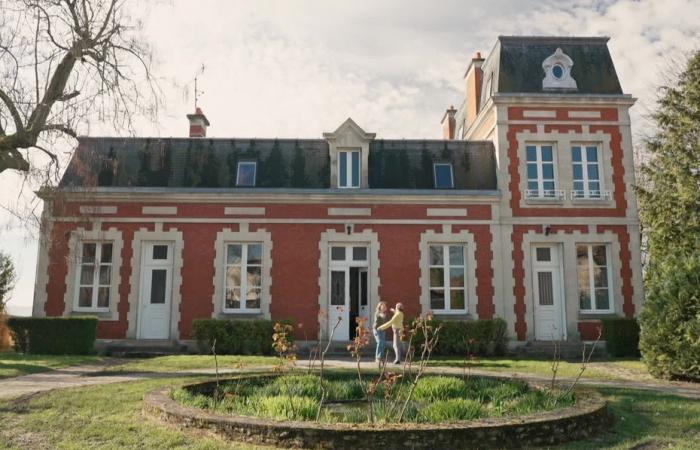It is a superb residence with a past full of history: the red house of Céline and Raphaël. Thanks to their decorator, they gave a second lease of life to this old 19th century grape harvester. A successful renovation which highlights the original elements. In this episode of Cozy, the decoration mag, we go to meet them.
The essentials of the day: our exclusive selection
Every day, our editorial team reserves the best regional news for you. A selection just for you, to stay in touch with your regions.
France Télévisions uses your email address to send you the newsletter “The essentials of the day: our exclusive selection”. You can unsubscribe at any time via the link at the bottom of this newsletter. Our privacy policy
Today, we are taking you 30 kilometers from Reims. We go to meet Céline, her husband Raphaël and their interior designer, Annabelle Brun. The couple wanted a family home in the countryside. What Céline and Raphaël liked was the position of the house. It dominates the village and is very well exposed to the sun. Its environment is superb. The residence is in the middle of a park which offers generous nature to the family. Enough to completely disconnect. To feel at home, it took a year of work. In this episode of Cozy, the decoration magwe set off to discover this astonishing living space, 500 square meters in size and tastefully decorated.
If Céline fell in love with this bourgeois house to renovate, her husband Raphaël fell in love with its history. We find him in a living room, by the fire and he tells us: “a small event happened during the First World War, the house was destroyed and contrary to what one might believe, it was destroyed by the English. The house was the HQ of the English. The Germans took over village and the English fled. They burned their staff maps and the house caught fire. The house was then rebuilt in red bricks, which earned it the name “red house”.
When you enter the house, you find a very large entrance which leads to all the reception rooms, looking like a cabinet of curiosities. A vintage display case sits against one wall. There are a whole bunch of objects from the couple including butterfly entomology frames. A fauna and flora theme which fits the house perfectly into its environment.
Curiosity cabinets are rooms or pieces of furniture where rare and unique things are displayed.
•
© France Télévisions
The star of this entry is the soil. It is an authentic mass-tinted cement tile. It is true that when you are lucky enough to have an old house, with cement tiles, you know that they are dated, from the beginning of the 20th century to the 1950s. It is a time when we worked on art nouveau motifs, inspired by plants, which fits very well with the theme of this spacious entrance. The highlight of the show: theater seats. “They come from the Comédie de Reims. When we had a subscription, at the time when the comedy decided to change all its seats, we had the right, for a symbolic euro, to an armchair”explains Céline. Today, we find these old cinema, theater and opera seats at auctions and second-hand dealers. They have crazy charm. However, it is necessary to keep in mind that we must find a way to fix them. If you have a wooden floor, it is possible to use screws, in concrete, they can be sealed. Otherwise, like Céline and Raphaël, it is possible to put them on a base, or even on casters.
Theater or cinema seats can be a great decorative idea.
•
© France Télévisions
In the music room, we discover a piano and panoramic wallpaper. It was reissued by a major French brand specializing in the reissue of wallpaper kept at the Musée des Arts Déco in Paris. “This reproduces a landscape from the 19th century and which is called “the French West Indies”. There is romanticism, the spirit of travel, discovery and which lends itself well to an artistic place as well as a piece of music”explains Céline. The particularity of panoramic wallpapers is that the patterns are not repetitive, but represent an entire landscape. In this house, we find this type of wallpaper in three other rooms. The owners wanted them to be more lively. Particularly in a bedroom on the ground floor, which they decorated with wallpaper inspired by Chinese iconography from the end of the 18th century. In two other bedrooms, the wallpaper serves as a headboard (an excellent decorative idea for demarcating spaces). These two wallpapers have the particularity of having decorated the bedroom of George Sand’s daughter.
Panoramic wallpaper gives a lot of depth to a room.
•
© France Télévisions
To have this type of high-end wallpaper at home, you need to count on 1,000 to 1,500 euros for the material, without installation. You can of course find panoramic wallpapers in all large decoration stores at affordable prices, around 20 euros per square meter.
Throughout the house it has a very nice paint job. In the living room for example, the walls and ceiling are painted. This makes the volume cozier and warmer. It is not usual to paint the ceiling. But, in decoration, you should not hesitate to paint a room in this way to obtain an enveloping effect, whatever the color.
For a warm and cozy effect, don’t hesitate to paint your ceiling the same color as your walls.
•
© France Télévisions
It is in the kitchen that we meet Annabelle, decorator. A lot of teamwork was done here. It was a big challenge because it’s a small kitchen in a very large family house. Annabelle optimized it as best as possible. Here again, we find period cement tiles on the floor. The dining table is an old draper’s table that the owners found. To have a reminder of the kitchen, Annabelle placed the same material used for the worktop on the table: dekton. It is an agglomerate of several natural stones. Dekton reduces water absorption, is stain resistant, has a low environmental impact and the color variations are endless. In short, this material is ideal for a kitchen.
The cuisine of Céline and Raphaël.
•
© France Télévisions
We find ourselves on the penultimate floor of the house. This is the children’s dormitory. The room’s furnishings and decoration are by Annabelle and Pierre-Emmanuel Decarreaux, cabinetmaker and wood turner. Annabelle designed the dormitory and Pierre-Emmanuel created the six beds there. It was a real challenge for them to make this piece, because they had to deal with many constraints including beams and a part of the base. “I drew everything to the nearest millimeter. And Pierre-Emmanuel created this dormitory with his goldsmith’s fingers”explains Annabelle. In this room, we would dream of being 6 years old again, like at summer camp.
What child has never dreamed of having a dormitory at home?
•
© France Télévisions
The children’s bathroom is also a real time machine. It feels like a school from the 1950s. The basins are waste disposal sinks that have been diverted. They are generally found in workshop funds. They don’t take up much space, which allowed Annabelle to fit several. Children are also entitled to an XXL shower, adorned with a magnificent white canopy. Annabelle made the interesting choice of placing the glass roof on a base. This allows for more privacy and isolates the lower parts of the body.
A bathroom worthy of a boarding school, high-end and XXL version.
•
© France Télévisions
On the top floor, in the dungeon, a games room was created. It’s a huge room. There is table football, television, a library. This room looks completely different from the rest of the house. It has a very cozy Scottish decor. The walls and ceiling have a very dark color. The floor is tartan patterned carpet.
The highlight of the show: the games room in the house’s dungeon.
•
© France Télévisions
If the adventure of renovation tempts you, know that you need to count on average between 1,500 and 2,500 euros per square meter for a complete renovation. Don’t hesitate to hunt for old materials in building flea markets. Take the time to immerse yourself in the history of the house and accept the constraints it imposes on you. This is the key to keeping the soul of the place.






